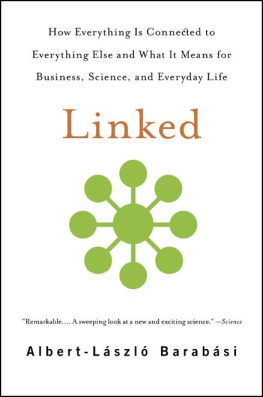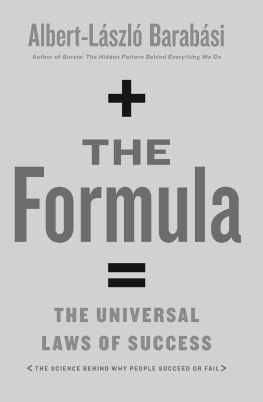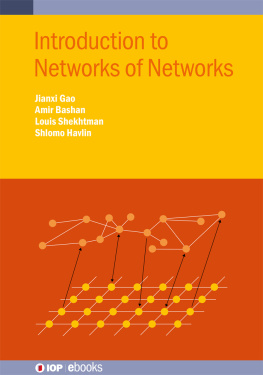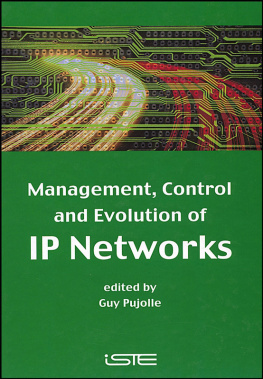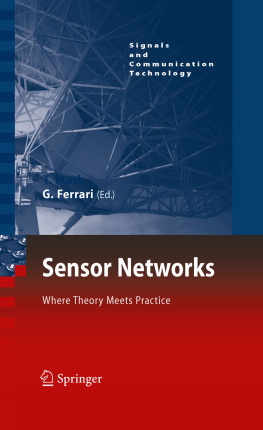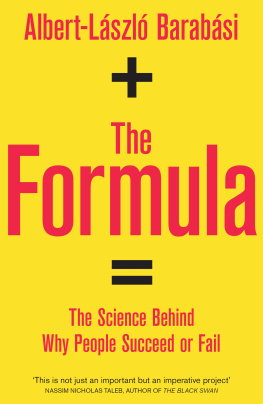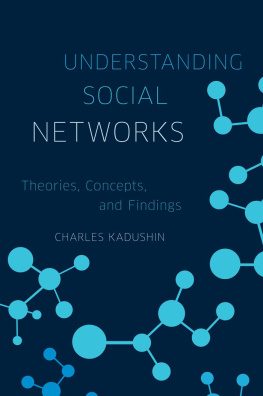Praise for Albert-Lszl Barabsis Linked
A pleasure to read.... Its the fact that all of these networks can be explained and understood using the same concepts, and the same mathematics, that makes this book so important. The Christian Science Monitor (A Best Book of the Year)
The observations of Albert-Lszl Barabsi about networks have broad applications in business.... Well written... an intellectual detective story. The New York Times
Linked should be mandatory reading for academics as a primer in good writing. Barabsi may be a scientist, but he didnt neglect his liberal arts education; his Renaissance mans curiosity roves across history, economics, medicine, and pop culture. He writes in understandable lay-speak glittering with wit. The Boston Globe
Linked gets really interesting, showing how this new science promises to change the way we conduct everything from medical treatment to the war on terrorism. The Washington Monthly
All researchers dream of making a discovery that will transform their field. Albert-Lszl Barabsi can go one better. In just three years, his discovery has started making waves in fields as diverse as ecology, molecular biology, computer science, and quantum physics. New Scientist
A lively look at networks through time. The Washington Post
A sweeping look at a new and exciting science. Donald Kennedy, editor-in-chief, Science Magazine
These laws of networks may prove as robust and universal as Newtons laws of motion. strategy + business (A Best Business Book of the Year)
Linked is the best choice for the layperson, because [Barabsi] minimizes the math and writes elegantly. Detroit Free Press


Copyright 2014 by Albert-Lszl Barabasi.
Published by Basic Books, A Member of the Perseus Books Group in 2014.
First published by Perseus Publishing in 2002.
All rights reserved. No part of this book may be reproduced in any manner whatsoever without written permission except in the case of brief quotations embodied in critical articles and reviews. For information, address Basic Books, 250 West 57th Street, New York, NY 10107.
Books published by Basic Books are available at special discounts for bulk purchases in the United States by corporations, institutions, and other organizations. For more information, please contact the Special Markets Department at the Perseus Books Group, 2300 Chestnut Street, Suite 200, Philadelphia, PA 19103, or call (800) 8104145, ext. 5000, or e-mail .
LCCN: 2014937841
ISBN (e-book): 978-0-465-03861-9
10 9 8 7 6 5 4 3 2 1
Contents


FEBRUARY 7, 2000, SHOULD HAVE BEEN a big day for Yahoo. Instead of the few million customers that daily flock to the Internet search engine, billions tried to enter the site. Such exploding popularity should have turned the company into the most valuable asset of the new economy. There was a problem, however. They all arrived at the exact same time and not one of them asked for a stock quote or a pecan pie recipe. Rather, they all sent, in scripted computer language, the message Yes, I heard you! Yahoo, as far as it could tell, had said nothing. Nevertheless, hundreds of computers in Yahoos Santa Clara, California, headquarters were kept busy responding to these screaming ghosts, while millions of legitimate customers, who wanted a movie title or an airline ticket, waited. I was one of them. Naturally I had no idea that Yahoo was frantically busy serving ten billion ghosts. I was patient for about three minutes before I moved to a more responsive search engine. The next day the royals of the Web, Amazon.com, eBay, CNN.com, ETrade, and Excite, fell under the same spell: They too were obliged to serve billions of ghosts making the same fruitless inquiry that had handicapped Yahoo. True consumers, with shiny credit cards ready for purchases, were forced to wait on the sidelines.
Of course, getting billions of real computer users to type Yahoo.com into their browser at precisely 10:20 Pacific Standard Time is impossible. There are simply not enough computers around. Early news reports construed the shutdown of the leading e-commerce sites to be the work of a group of sophisticated hackers. The consensus was that these renegade geeks, fascinated by the challenge of outsmarting sophisticated security systems, had hijacked hundreds of computers in schools, research labs, and businesses and turned them into zombies, telling Yahoo thousands of times, Yes, I heard you. Every second, huge amounts of data were thrown at this prominent Website, much more than it could ever handle. The massive denial-of-service attack Yahoo was experiencing set off a much-publicized international hunt for the hackers responsible.
Surprisingly, the high-profile operation of the Federal Bureau of Investigation did not lead to the much-anticipated cyberterrorist organization. Instead, the FBI arrived at the suburban home of a Canadian teenager. Investigators eavesdropping on an Internet chat room overheard the teen soliciting suggestions for new targets to attack. He was caught bragging.
Hiding behind the pseudonym MafiaBoy, this fifteen-year-old successfully halted the operations of billion-dollar companies with access to the best computer security experts in the world. Was he a contemporary David who, armed with the humblest of home computer slingshots, beat the mega-Goliaths of the information age? In hindsight, experts agree on one thing: The attacks were not the work of a genius. They were executed using tools available to anybody on various hacker Websites. MafiaBoys online antics revealed him to be a rank amateur, whose sloppy trail led the police right to his parents door. In fact, his actions were more reminiscent of a Goliath than David: Lacking the know-how to penetrate any of the sites he attacked and clumsy and slow on his feet, he only managed to take down easy targets, obviously vulnerable computers from universities and small companies, which he simply instructed to bombard Yahoo with messages.
One can imagine a fifteen-year-old boy behind his bedroom door, in the glow of his computer, finding sweet satisfaction in the protracted Yes, I heard you! hurled at Yahoo. He must have screamed that phrase himself a million times when Mom or Dad called him to come to dinner or take out the trash. The attack succeeded with brute force, a lot of nerve, and little sophistication. But this is exactly what makes us wonder, how could this teenagers actions take out the largest corporations of the new economy? If a mere youth can wreak havoc on the Internet, what could a small group of trained and skilled professionals achieve? How vulnerable are we to such attacks?
The early Christians were nothing more than a renegade Jewish sect. Regarded as eccentric and problematic, they were persecuted by both Jewish and Roman authorities. There is no historical evidence that their spiritual leader, Jesus of Nazareth, ever intended to have an impact beyond Judaism. His ideas were difficult and controversial enough for Jews, and reaching the gentiles seemed particularly hopeless. As a starter, those non-Jews who wanted to follow in his footsteps had to undergo circumcision, had to obey the laws of contemporary Judaism, and were excluded from the Templethe spiritual center of early Jewish Christianity. Very few walked the path. Indeed, reaching them with the message was almost impossible. In a fragmented and earthbound society news and ideas traveled by foot, and the distances were long. Christianity, like many other religious movements in human history, seemed doomed to oblivion. Despite the odds, close to two billion people call themselves Christian today. How did that happen? How did the unorthodox beliefs of a small and disdained Jewish sect come to form the basis of the Western worlds dominant religion?
Next page
